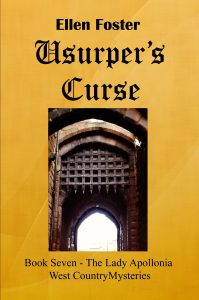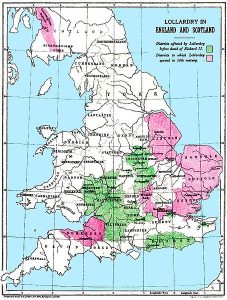 Greetings again and thanks for joining us as we continue examining topics which arise in Usurper’s Curse, the seventh book in my Lady Apollonia West Country Mysteries Series. In this monthly posting, I am writing of “Lollardy”, a topic that makes an important appearance in this story.
Greetings again and thanks for joining us as we continue examining topics which arise in Usurper’s Curse, the seventh book in my Lady Apollonia West Country Mysteries Series. In this monthly posting, I am writing of “Lollardy”, a topic that makes an important appearance in this story.
“Lollardy” is a term referring to the reformed religious followers in England of the Oxford scholar John Wycliffe. The term “Lollardy” was first used in England in 1387 by the Bishop of Worcester in whose diocese Usurper’s Curse is set. The green areas in the map, shown below on the right, indicate that Lollardy had taken hold in Gloucestershire in the years before my novel is set there.
Some of Wycliffe’s ideas that appealed to Lollards were that scripture is the reliable guide to religious truth, that monastic life and the papacy were corrupt, and that transubstantiation during the mass and the sacrament of confession were untrue teachings.
John Wycliffe was the Prebend of Aust when Lady Apollonia was raising her five sons and, in my story, Wycliffe had an influence on the Lady’s middle son Thomas’ later decision to become a priest. Wycliffe appeared in Effigy of the Cloven Hoof and “Lollardy”, appears again in Memento Mori among the merchant colleagues of Richard Windemere, Apollonia’s third husband.
Thomas Arundel, the Archbishop of Canterbury who also became Chancellor of England, plays an important role in Usurper’s Curse. By the time of my story in 1406, Arundel had been a champion for many years of finding and punishing Lollards as heretics, and his pursuit of heretics is a recurring theme throughout Usurper’s Curse. Nine years later, the Council of Constance declared that Wycliffe’s books should be burned, and later his body was taken from his grave and burned in 1428, 44 years after he died.
A well-known leader of the Lollard movement and its center in Bristol at the time of my story was John Purvey, a real-life character, who is introduced as a good friend to the fictional knight, Sir Julian Thurgood. Although Wycliffe is credited with producing the first English translation of the bible in 1382, Purvey tried to make it more accessible and comprehensible in his revision of 1388. Then, in 1401, he recanted when threatened with being burnt at the stake. By the time of Usurper’s Curse, he had regretted his recantation and was again preaching Lollard ideas. The next year, 1407, he was arrested and later died in prison from natural causes.
Another fictional character, Mark Marimon, a friend of Sir Julian Thurgood, meets Lady Apollonia while he is on the run because Marimon is suspected of being a Lollard heretic. Purvey comes into my story because Sir Julian Thurgood was staying with him in Bristol, and it is Thurgood whom Apollonia seeks to come to Aust at the request of Mark Marimon.
 Lady Apollonia’s brother, Ferdinand, Earl of Marshfield, was suspicious of Lollards. Neither the Lady Apollonia nor anyone in her affinity identified themselves as Lollards, but she and several others were sympathetic to many on Wycliffe’s ideas about what needed reforming in the Roman Catholic Church.
Lady Apollonia’s brother, Ferdinand, Earl of Marshfield, was suspicious of Lollards. Neither the Lady Apollonia nor anyone in her affinity identified themselves as Lollards, but she and several others were sympathetic to many on Wycliffe’s ideas about what needed reforming in the Roman Catholic Church.
Lollards persisted into the 16th century and beyond and were largely absorbed into the various branches of Protestantism.
Please join us again next month.